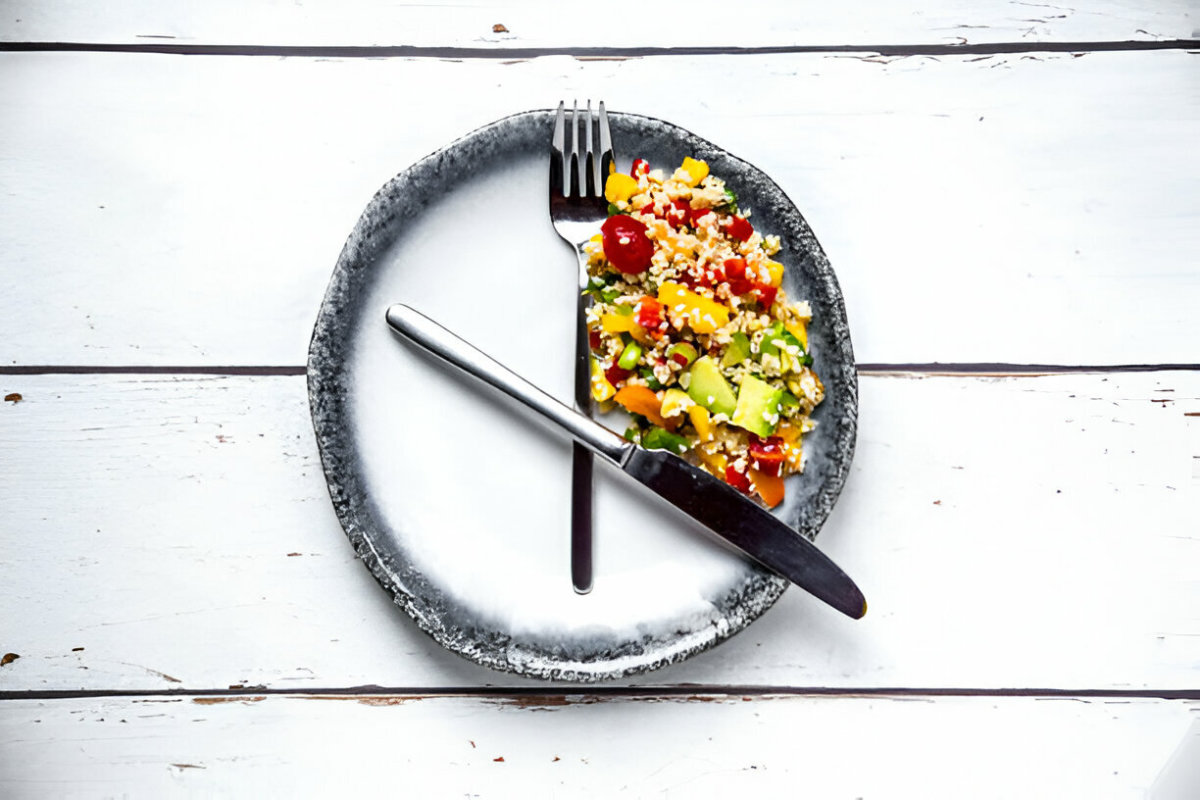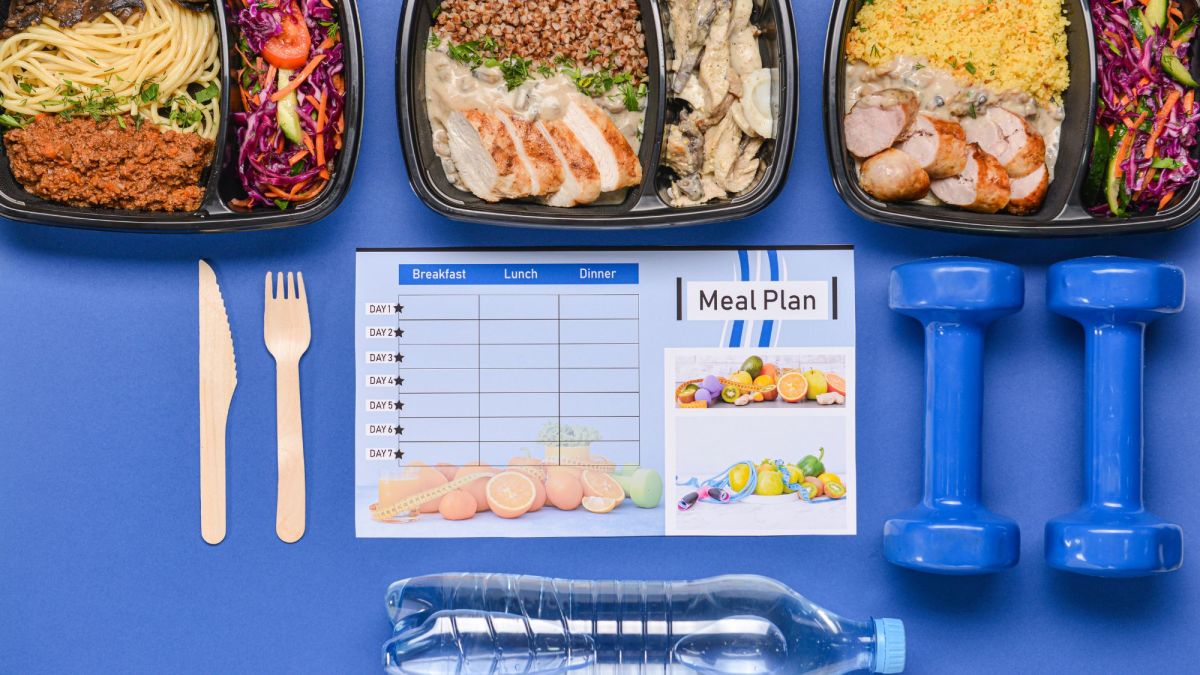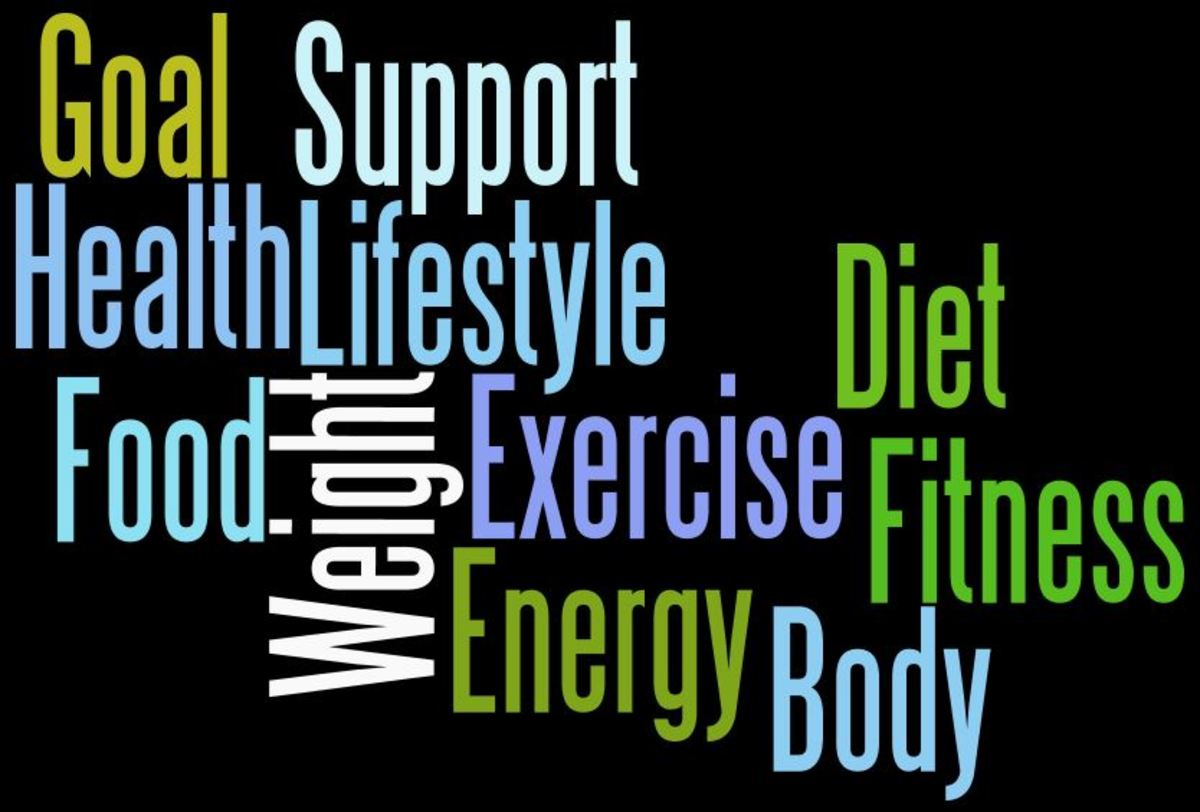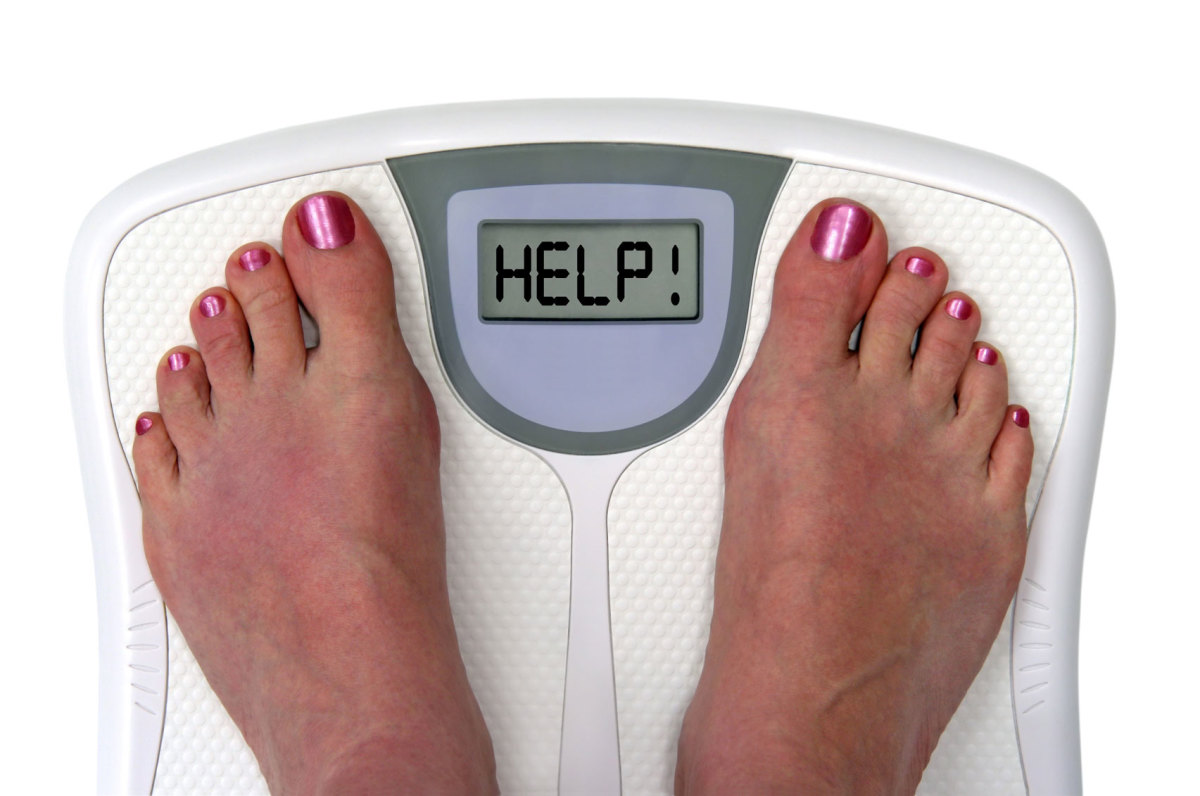- HubPages»
- Health»
- Diet & Weight Loss»
- Diet Advice & Tips
Weight Loss Tricks that Work

Trick Your Brain with Thin Thoughts
Everyone knows that losing weight is tough, except for thin people. They keep slender naturally, and not only due to good genes and a fast metabolism.
Skinny people think thin. You can think thin thoughts, too, and lose weight better than ever. We all know that to drop the pounds, one must exercise and eat healthful foods in sensible portions. All the diet programs are some spin-off of this dietary bottom-line. Yet, most dieters don’t break their fat loss-gain cycle because they haven’t worked on the brain game side of weight management.
What, why and how we eat is determined largely by our beliefs and attitudes toward food. For many of us, food is not merely sustenance but feelings that are attached to everything from jubilation and reward to comfort and self-worth. Food becomes ways for us to self-medicate emotional wounds as well as to celebrate life. Food provides good feelings.
This is why dietary deprivation never works for long. It goes against human nature. We need food and like to feel good. But there are ways to work with your brain to learn new beliefs and attitudes about food and eating. Learn some of the thin thoughts and beliefs held by naturally slim people so you can reach your healthy weight level, too.
“This isn’t my last meal.”
Some people forget that we live in an abundant place and time when our meals come at regular intervals throughout the day—whenever we choose—but we eat as though this is our last meal. Remind yourself that you will be eating again in a few hours. You don’t need to gorge yourself now.
“Full feels foul. Light feels right.”
We know we shouldn’t stuff our bellies until they reach full capacity and that it takes 20 minutes for our brains to get the sated signal. Yet we eat on because most of us confuse that full feeling with having had enough. A full stomach is different from the “just enough” stomach. Mary Poppins taught her young charges that “just enough was as good as a feast.” Overeaters become desensitized to that just enough feeling, and they eat until they feel the full feeling. If you’ve ever had that unpleasant “I ate too much” feeling, having to unbutton the top button of your pants and sitting in a food-induced stupor after the holidays, then you know how thin people feel when they eat until their stomachs are full. Thin people connect “fullness” with feeling overly engorged. They like the light feeling of a bit of space in the gut. Remind yourself that if you feel a little space, it’s supposed to feel that way and you don’t need to stuff your stomach to capacity.
Does this pic make you feel guilty?
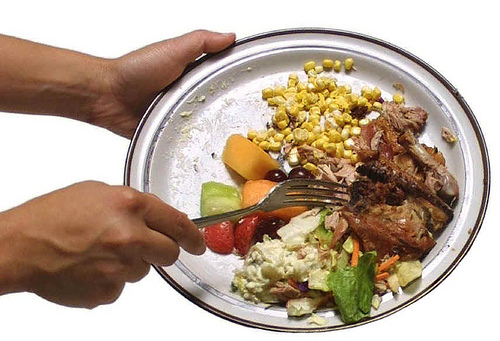
WAIST it or WASTE it?
“Leftover food? I can waste it or waist it.”
Well-meaning mothers didn’t realize that their generation had to cope with scarcity, but today’s generation needs to know how to live with overabundance. If you are concerned about wastefulness, buy or prepare less. Put less on your plate. At restaurants, split gigantic portions into two or three for later meals or to share. Also, remind yourself that there are more ways to “waste” your food. Tossing it out is only one way to waste it. You can “waist” it. You waste/waist food when you put it into your body when it is not needed. It stores as fat that damages your body which will require costly medical intervention to repair. Remind yourself that throwing away food that costs a few dollars is cheaper than paying medical bills.
“I’ve had my share.”
On the way to being overweight, you’ve enjoyed many delicious but dangerous foods. There is no need to indulge in the same unhealthy foods again and again. You’re not being deprived. You know what they taste like. When someone passes around the treats, remind yourself that you’ve had your more than your share of cake or candies in life. Leave some for others. Remind yourself that if you continue to have more than your share, you will have a shorter life.
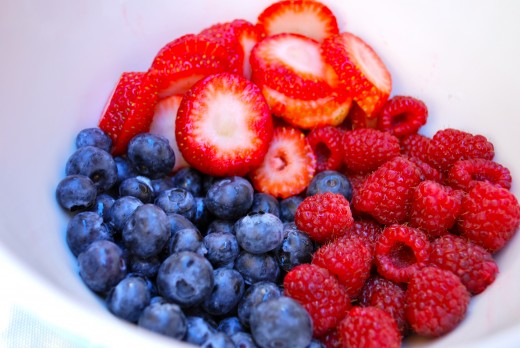
Clean foods taste clean
“I keep cheap junk out of my trunk.”
Everyone loves to get the most for what they pay. Buffets and restaurant specials are bargains. People may see the reason why it isn’t wise to guzzle two dozen Happy Hour drink specials because of inebriation but they don’t think twice about pounding down plate after plate of meats, seafood, pasta, potatoes, breads and desserts at a buffet. Although the effects aren’t as immediate, overeating is just as harmful. Fast food and junk food may be cheap but they are not bargains in the long run. In your mind, relate cheap foods as unhealthful and beneath your worth. Remind yourself that quality is worth it and so are you.
“I can have anything I want but I choose something more healthful.”
No one forces thin people to eat healthful foods. They want them. They prefer them. They choose them. They know that they can eat anything they want and so can you. If you want a fat-laded, sugar-loaded, high-calorie food, eat it. Enjoy it. No one is going to keep you from it. But because you also want a more healthful lifestyle, you have better choices to enjoy. Once you know you can have anything you want, suddenly nothing seems tantalizingly forbidden. Your mind panics when control is being taken away, as in “You can’t have this.” Know you can have it. But wouldn’t you rather have something so much better?
“Healthful foods taste pure, clean and fresh.”
Your palate becomes accustomed to what you feed it. Ask any recovered sugar addict and he will describe how natural fruits taste fantastic while candies are sickeningly sweet. Refrain from high-fat foods for a while and when you eat them again, you’ll find them cloying and oily instead of satisfying. Think of healthful foods are pure and clean. Soon, your tastebuds will prefer fresh over processed. Your mouth will become educated and discriminating while your body and mind get wholesome nourishment for optimum performance. Remind yourself that healthful foods cleanse and optimize you.
"Junk food tastes gross."
Learn to associate the taste of fatty, greasy, processed foods with bad feelings and unpleasant flavors. Once, my daughter ate a large bready sandwich and got sick. She said it felt like a "glue bomb" in her stomach which is exactly what all that processed starch turned into. From then on, we used that term "glue bomb" to deter us from eating anything overly starchy.

FEEL GOOD!
“Nothing tastes as good as being healthy feels.”
Slender people like feeling healthy better than they like to overeat because eating tastes good for only a few minutes while being at a healthy weight feels great for the rest of their lives. The good feelings from eating food do not last; in fact, the often turn sour and regretful quickly. Remind yourself that you like feeling healthy better than overeating.
“This is more than enough.”
Thin people think in terms of a plate half full rather than half empty. They leave white spaces on their plate when filling it up. Overweight people pile on the food. For thin people, a cup of coffee with cream and sugar contains calories and thus becomes a mini-meal. A mug of chicken broth is a satisfying snack. Thin people know that every calorie counts as energy for their bodies. Fat people conveniently forget about the little bits and bites—a handful of chips, a shared cookie, the extra large serving of sugary ketchup or pancake syrup—they shove into their mouths throughout the day and don’t count them as “eating” when these calories do add up. Think in terms of fueling your body which really requires fewer calories than you take in.
“Flavor not fullness.”
Overeaters don’t think a meal is a meal unless it contains several courses when, in fact, one needs to think in overall calories. Skinny people don’t need to eat a bread, salad, hot vegetable, meat and starch for dinner. There are sufficient calories in the vegetables and protein. For dessert, they enjoy a half portion because they don’t need a full portion to savor the flavor or feel satisfied. Remind yourself that flavor - not fullness - is the key to true enjoyment.
“I’m healthy and thin.”
Believe that you are thin. Visualize yourself as thin. When you think of yourself as a healthy, slender person, you begin to behave in ways that thin people behave. You’ll become more active, drink more water and eat smaller portions. Your brain sees what you want to see. Believe thin thoughts.
Repeat these thoughts in your mind as often as possible. Replace any former “fat” thoughts and beliefs about yourself with these powerful affirmations and your brain will begin a curious transformation of your body.
And always remember: this is not your last meal!
What do you tell yourself?
I often tell myself that...
It's all in your mind
More Mind Games for Weight Loss


![NatureWise CLA 1250 - Conjugated Linoleic Acid Supplement for Women and Men, Not Stimulating, Supports Healthy Weight, Fitness Goals - Non-GMO, Gluten Free - 180 Softgels[2-Month Supply]](https://m.media-amazon.com/images/I/41EHR+l7yPL._SL160_.jpg)
